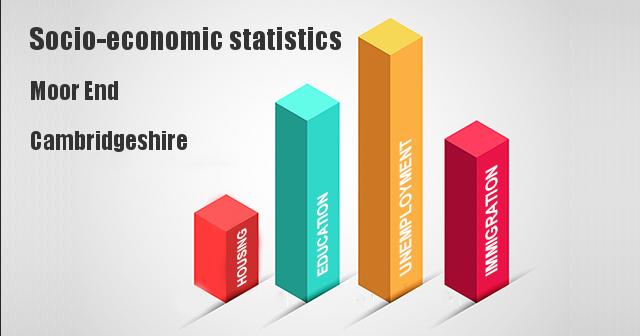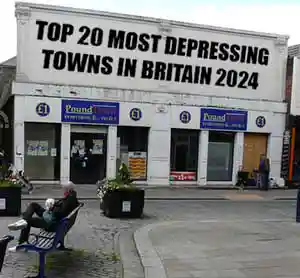Is Moor End in South Cambridgeshire a nice place to live or is it a bit rough? We have collated a series of socio-economic statistics and demographics from UK government sources such as the 2021 Census and the Index of Multiple Deprivation. They should give you a broad snapshot of the area and the surrounding locations. Are the residents of Moor End older than the national average or younger? What is the population of Moor End and South Cambridgeshire? What is the claimant count in Moor End and how many residents are unemployed? This page should provide you with the answers.Moor End Education Statistics
We have taken the raw data from the 2021 census to found of the level of education Moor End residents have in terms of formal qualifications as a percentage. The UK government breaks qualifications down into 7 levels. A detailed explanation of these levels can be found here. However, the Census groups these into just 4 \'levels\'. Here are some examples of the qualifications each census level represents when not stated;
- Level 1 - GCSE grades D, E, F, or G & below
- Level 2 - GCSE A*, A, B, C or O Level grades A, B or C
- Level 3 - A or AS qualification at any grade
- Level 4 - HNC, Bachelors Degree, Masters Degree or Phd
In this first table we have compared Moor End to the national average for England.
| Level | Melbourn | England |
|---|
| No Qualifications | 15.39% | 18.08% |
| Level 1 | 9.21% | 9.69% |
| Level 2 | 12.54% | 13.32% |
| Apprenticeship | 4.73% | 5.32% |
| Level 3 | 14.85% | 16.92% |
| Level 4 | 41.29% | 33.92% |
Moor End & South Cambridgeshire Immigration Statistics
We have analysed the Census 2021 raw data on country of birth and compiled immigration statistics as percentages of the population. All percentages have been rounded to two decimal places. Below are the figures for Moor End in the South Cambridgeshire local area district.
Moor End has a lower rate of immigrants than South Cambridgeshire, the East of England region and England as a whole. | Area | Born in UK | Born outside UK |
|---|
| Melbourn | 91.64% | 8.36% |
|---|
| South Cambridgeshire | 83.84% | 16.16% |
|---|
| East | 85.09% | 14.91% |
|---|
| England | 82.65% | 17.35% |
|---|
Moor End compared to other wards in South Cambridgeshire
| # | Ward | Born in UK | Born outside UK |
|---|
| 1 | Fen Ditton & Fulbourn | 75.11% | 24.89% |
|---|
| 2 | Bar Hill | 78% | 22% |
|---|
| 3 | Histon & Impington | 79.31% | 20.69% |
|---|
| 4 | Girton | 79.48% | 20.52% |
|---|
| 5 | Milton & Waterbeach | 79.63% | 20.37% |
|---|
| 6 | Harston & Comberton | 80.63% | 19.37% |
|---|
| 7 | Shelford | 81.56% | 18.44% |
|---|
| 8 | Hardwick | 84.89% | 15.11% |
|---|
| 9 | Caldecote | 86% | 14% |
|---|
| 10 | Whittlesford | 87.53% | 12.47% |
|---|
| 11 | Cottenham | 87.64% | 12.36% |
|---|
| 12 | Swavesey | 89.08% | 10.92% |
|---|
| 13 | Linton | 90.64% | 9.36% |
|---|
| 14 | Foxton | 91.44% | 8.56% |
|---|
| 15 | Melbourn | 91.64% | 8.36% |
|---|
| 16 | Bassingbourn | 91.79% | 8.21% |
|---|
| 17 | Balsham | 92.24% | 7.76% |
|---|
| 18 | Barrington | 92.37% | 7.63% |
|---|
| 19 | The Mordens | 92.73% | 7.27% |
|---|
| 20 | Gamlingay | 95.04% | 4.96% |
|---|
';Moor End is ranked 15 out of 20 wards in South Cambridgeshire for the number of residents born outside of the UK.Moor End Age Distribution Statistics
We have taken the raw data from the 2021 Census and the calculated the proportion of age groups in Melbourn.| Age Band | Proportion |
|---|
| 4 & under |  |
| 5 - 9 years |  |
| 10 - 15 years |  |
| 16 - 19 years |  |
| 20 - 24 years |  |
| 25 - 34 years |  |
| 35 - 49 years |  |
| 50 - 64 years |  |
| 65 - 74 years |  |
| 75 - 84 years |  |
| 85 years & over |  |
Moor End Health Statistics
Melbourn has more residents (very_good_pc-$country_health->very_good_pc, 2)%) describing their health as very good than the national average for England.| Area | VG | G | F | B | VB |
|---|
| Melbourn | 48.69% | 34.63% | 12.55% | 3.14% | 0.99% |
| South Cambridgeshire | 52.21% | 33.62% | 10.74% | 2.66% | 0.77% |
| East | 48.28% | 34.64% | 12.5% | 3.58% | 1% |
| England | 48.49% | 33.71% | 12.65% | 3.98% | 1.17% |
VG = Very Good, G = Good, F = Fair, B = Bad & VB = Very Bad
How has the health of residents in South Cambridgeshire changed since 2011?
South Cambridgeshire residents who describe their health as either good or very good has decreased by 0.34% between the 2011 and 2021 census.| Year | VG | G | F | B | VB |
|---|
| 2011 | 52.46% | 33.71% | 10.62% | 2.51% | 0.7% |
| 2021 | 52.21% | 33.62% | 10.74% | 2.66% | 0.77% |
VG = Very Good, G = Good, F = Fair, B = Bad & VB = Very Bad
Moor End Unemployment Statistics
Since the introduction of Universal Credit, The Department for Work & Pensions have not issued any statistics (in our view) that can be used to ascertain the levels of unemployment or under employment in the UK, just meaningless geographic counts. However, the Office of National Statistics does publish claimant counts of people receiving out of work benefits, be that legacy Jobseeker’s Allowance or Universal Credit as a proportion of people over 16. These figures are usually updated once a month and are for Local Authority Districts and Unitary Authority Districts. So below are the figures of South Cambridgeshire.| Area | Unemployed | Yearly Change |
|---|
| South Cambridgeshire | 1.8% | -0.1% |
| East of England | 3% | -0.3% |
| England | 3.8% | -0.3% |
| UK | 3.7% | -0.3% |
| Economic Status | Proportion |
|---|
| In Employment | 59.11% |
| In Part-Time Work | 28.5% |
| Unemployed | 2.58% |
How many residents own or rent their home in Moor End and South Cambridgeshire
We have taken the raw data from the 2021 census and calculated what proportion of people in Moor End either own or rent their home. All percentages have been rounded to two decimal places. 68.09 of residents own their home either outright or mortgaged. 31.91 of Moor End residents rent their home either privately or through a social landlord. | Area | Owned | Rented |
|---|
| Melbourn | 68.09% | 31.91% |
| South Cambridgeshire | 68.9% | 31.1% |
| East | 65.23% | 34.77% |
| England | 61.31% | 38.69% |
Moor End has a higher level of home ownership than than the national average.
Moor End compared to other wards in South Cambridgeshire
| # | Ward | Owned | Rented |
|---|
| 1 | Hardwick | 78.92% | 21.08% |
|---|
| 2 | Foxton | 77.73% | 22.27% |
|---|
| 3 | The Mordens | 75.36% | 24.64% |
|---|
| 4 | Bar Hill | 75.19% | 24.81% |
|---|
| 5 | Gamlingay | 74.83% | 25.17% |
|---|
| 6 | Cottenham | 73.9% | 26.1% |
|---|
| 7 | Balsham | 73.87% | 26.13% |
|---|
| 8 | Swavesey | 73.45% | 26.55% |
|---|
| 9 | Whittlesford | 73.12% | 26.88% |
|---|
| 10 | Caldecote | 72.46% | 27.54% |
|---|
| 11 | Girton | 71.92% | 28.08% |
|---|
| 12 | Harston & Comberton | 71.26% | 28.74% |
|---|
| 13 | Linton (South Cambridgeshire) | 70.8% | 29.2% |
|---|
| 14 | Barrington | 70.2% | 29.8% |
|---|
| 15 | Bassingbourn | 70.05% | 29.95% |
|---|
| 16 | Shelford | 69.68% | 30.32% |
|---|
| 17 | Melbourn | 68.09% | 31.91% |
|---|
| 18 | Milton & Waterbeach | 65.65% | 34.35% |
|---|
| 19 | Fen Ditton & Fulbourn | 61.03% | 38.97% |
|---|
| 20 | Histon & Impington | 60.55% | 39.45% |
|---|
Moor End is ranked 17 out of 20 wards in South Cambridgeshire for the percentage of home owners.What are the occupations of the residents of Moor End?
The largest employment sector in Moor End is Professional Occupations. The smallest employment sector is Process Plant & Machine Operatives.| Sector | Proportion |
|---|
| Professional Occupations | 25.09% |
| Managers, Directors & Senior Officials | 16.69% |
| Associate Professional & Technical | 14.38% |
| Skilled Trades | 10.66% |
| Administrative & Secretarial | 8.9% |
| Caring, leisure & Other Services | 7.98% |
| Elementary Occupations | 6.69% |
| Process Plant & Machine Operatives | 4.54% |
What is the population of Moor End and South Cambridgeshire?
The table below contains the populations figures for each ward in South Cambridgeshire including Moor End. These population ONS figures are estimated are dated Mid 2020.
| Ward | Population |
|---|
| Balsham | 3558 |
| Bar Hill | 4045 |
| Barrington | 3237 |
| Bassingbourn | 3869 |
| Caldecote | 4831 |
| Cambourne | 10544 |
| Caxton & Papworth | 6166 |
| Cottenham | 6660 |
| Duxford | 3953 |
| Fen Ditton & Fulbourn | 10809 |
| Foxton | 3381 |
| Gamlingay | 3678 |
| Girton | 5981 |
| Hardwick | 3053 |
| Harston & Comberton | 10203 |
| Histon & Impington | 12066 |
| Linton | 7361 |
| Longstanton | 6129 |
| Melbourn | 8298 |
| Milton & Waterbeach | 11360 |
| Over & Willingham | 6958 |
| Sawston | 7260 |
| Shelford | 7546 |
| Swavesey | 3625 |
| The Mordens | 3257 |
| Whittlesford | 3076 |
| South Cambridgeshire Total | 160904 |
Last updated: 20/02/2024, Additional Sources: Office for National Statistics & Department for Work & Pensions.














